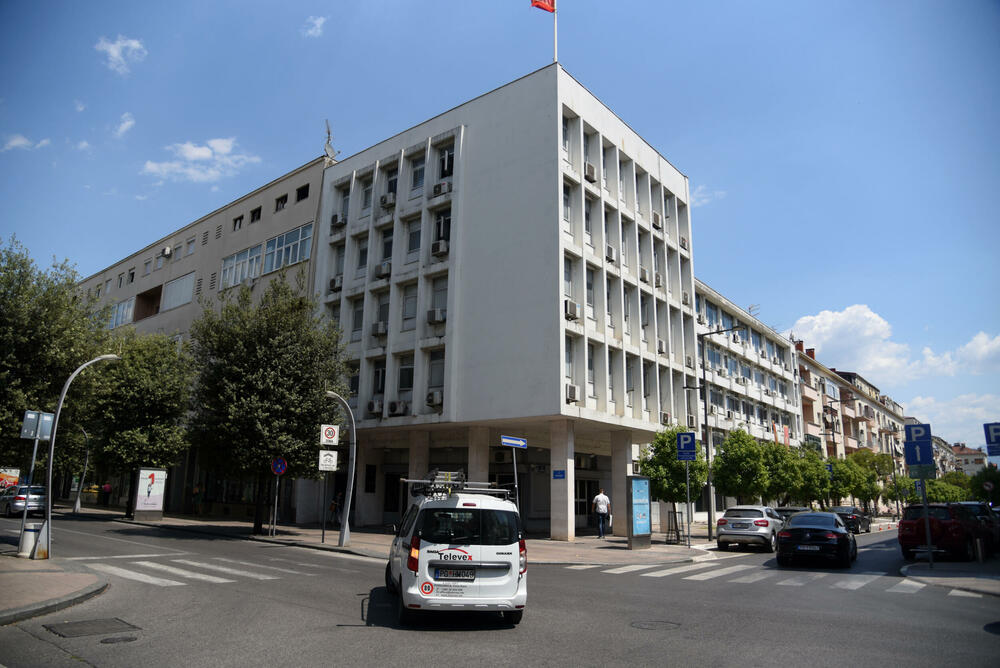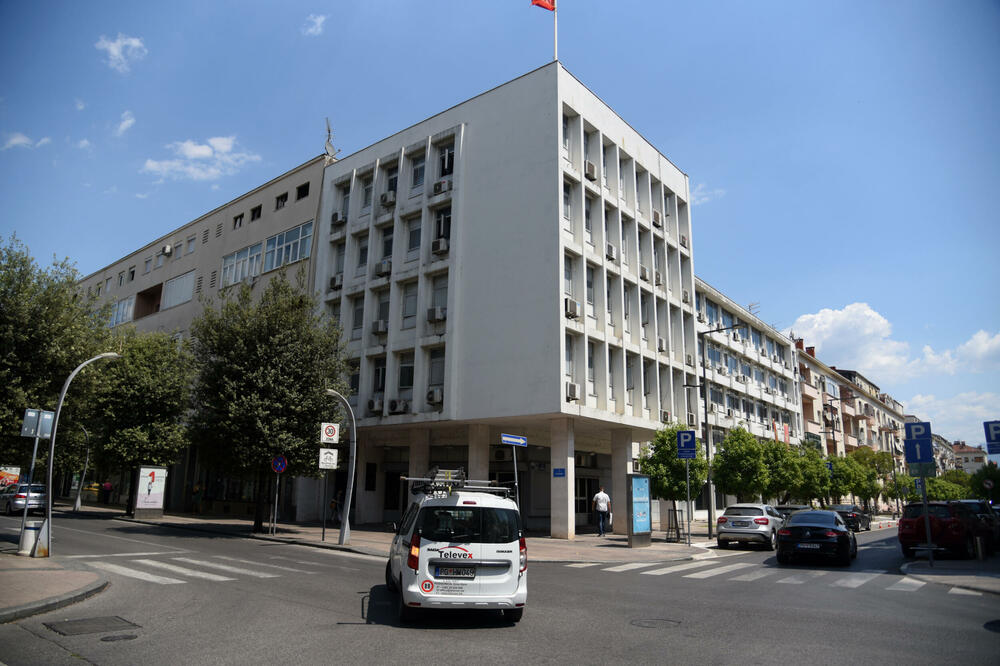Out of 75 inspections carried out in all Montenegrin prosecutor's offices, in the last six years, irregularities were found in only three cases by the judicial inspectors of the Ministry of Justice, Human and Minority Rights (MLJMP). In the last four years, in 49 inspections, inspectors did not note any errors.
This can be seen from the minutes of the performed regular supervision, which are Center for Investigative Journalism of Montenegro (CIN-CG) and the Center for Civil Liberties (CEGAS) obtained free access to information. All minutes from 2016 to 2021 have been provided to us.
The errors found are minor. During the inspection of the basic prosecutor's offices in Pljevlja and Ulcinj in 2016, it was determined that those prosecutors' offices did not properly keep registers for unknown criminal offenses for the previous year. And in the Basic State Prosecutor's Office in Bar, it was determined by the supervision of the Ministry of Justice in 2017 that the registry for known adult offenders in 2016 was not properly maintained.
In addition, on the same day in 2020, the same judicial inspector of the Ministry of Justice supervised the two most important Montenegrin prosecutorial bodies - the Supreme State Prosecutor's Office (VDT) and the Special State Prosecutor's Office (SDT). The following year, in 2021, one person in front of the Ministry of Justice once again inspected both of these prosecutor's offices in one day. In 2020, the supervision was carried out on May 26, and last year the supervision of SDT and VDT was carried out on April 28.
It follows from these inspections that the prosecutor's offices worked flawlessly, and that the only job of the judicial inspection is to control the work of the registry office and archives.
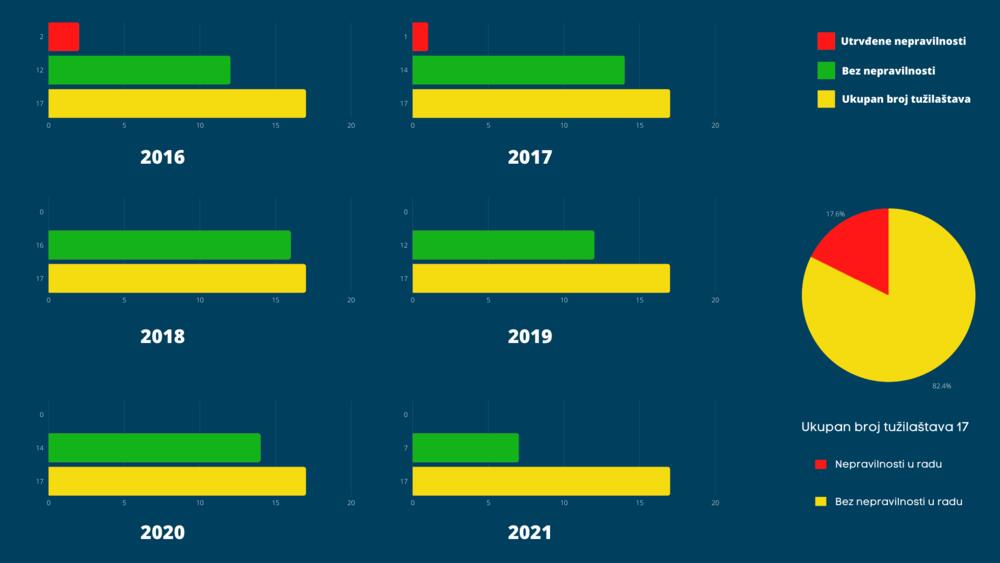
According to the Law on the State Prosecutor's Office, the inspection supervision of the Ministry of Justice foresees the supervision of: the work of the office and archives, keeping prescribed official records and other tasks related to the proper work and operations of the prosecutor's office.
In addition, the Ministry of Justice should also control the implementation of the Rulebook on the internal operations of the State Prosecutor's Office.
According to the Law on the State Prosecutor's Office, the Ministry, when performing supervision, must not influence the decision-making or the conduct of the investigation in the cases. In addition to supervising the prosecution, judicial inspectors are obliged to supervise the work of courts, bailiffs and notaries.
Several experts pointed out to CIN-CG that they doubt that the judicial inspection has so far essentially controlled the Montenegrin prosecutor's offices. It seems that they were only concerned with satisfying the form.
"The Judicial Inspection of the Ministry of Justice does not actually supervise. This was mostly done by the inspector having a little talk with the authorities in the prosecutor's offices, looking at the papers and doing everything in an hour or two," a source who previously worked in the Ministry of Justice and is well acquainted with the functioning of the judicial inspection explains to CIN-CG.
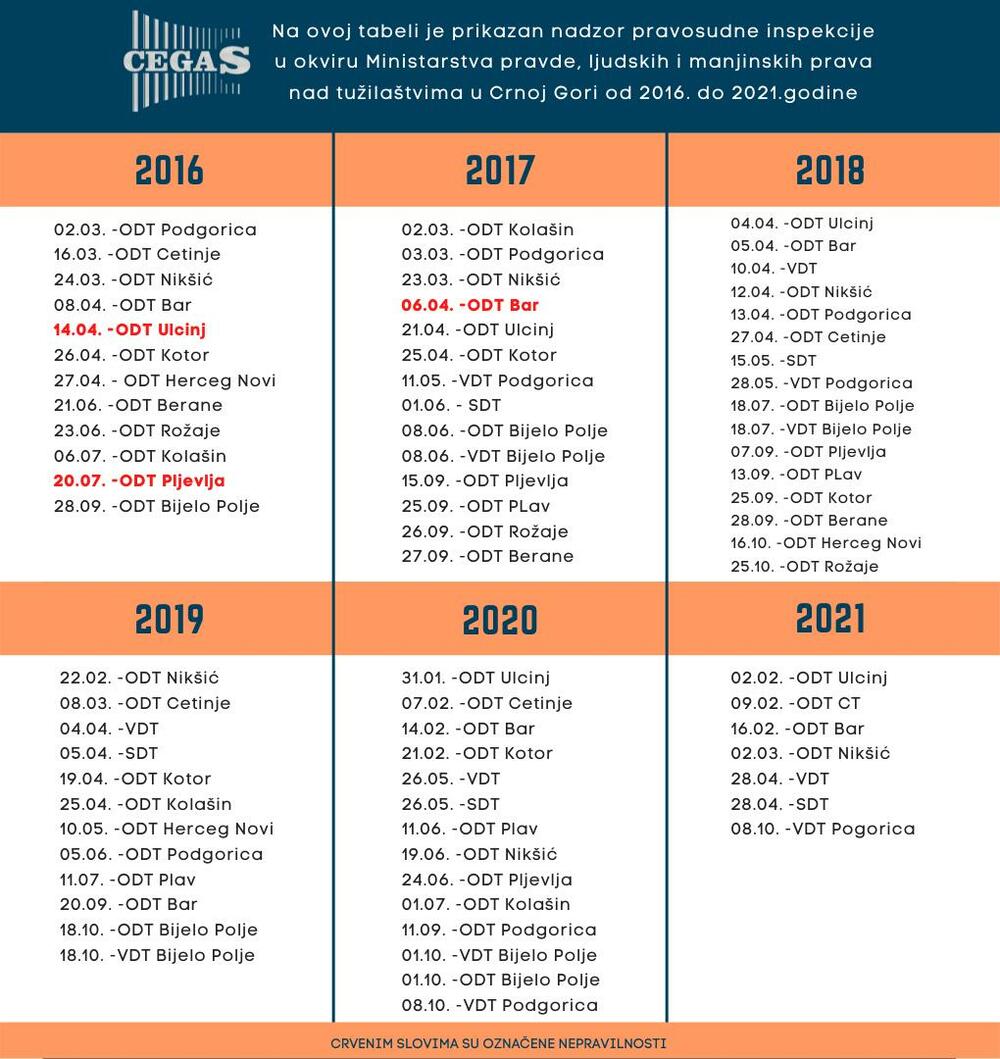
The supervision of the prosecution by the inspection of the Ministry of Justice is only one type of control, which should improve the efficiency of the system and identify possible errors. In addition, an important function should be performed by internal control within the prosecutor's office, which is performed by higher prosecutors over lower ones. However, as CIN-CG wrote recently, even that control was not carried out for five long years in most prosecutor's offices.
In the report of the European Commission (EC) on Montenegro for 2021, it is emphasized that there is no progress in the field of justice, that the implementation of key reforms is stagnant, and that the balance of achieved results is limited, especially when it comes to accountability.
Reform in this area is hardly possible without serious supervision - thorough internal and external control, which has clearly been lacking in recent years.
Judicial inspection is an important segment of EU accession
The Delegation of the European Union (EU) in Montenegro pointed out to CIN-CG that judicial reforms are at the very center of the process of Montenegro's accession to the European Union, and that the EU is carefully monitoring all developments in this area, as well as the progress made within certain temporary benchmarks in Chapter 23.
"The area of judicial inspection represents an important segment of reforms in the area of responsibility of the judicial system. In the latest annual report from October 2021, it was emphasized that it is necessary to further strengthen the capacity of the Ministry of Justice for the implementation of judicial inspection", the Delegation emphasizes.
The Ministry of Justice explains to CIN-CG that during 2020 and 2021, they had only one judicial inspector who was authorized to supervise courts and prosecutor's offices.
The work of supervising the work of the judicial and prosecutorial administration was carried out by two judicial inspectors until March 2020, when one inspector stopped working due to retirement, the Ministry for CIN-CG explains.
From then until the beginning of this year, only one inspector of the Ministry controlled the Montenegrin judicial system. "As of January 2022, the service has been strengthened in terms of personnel, as two more inspectors have been elected," the Ministry points out.
As they explain, according to systematization there should be five of them.
They also claim that the supervision during the previous two years was difficult due to the corona virus pandemic and the special work regime of the courts and state prosecutor's offices during the pandemic.
They emphasize that the quality and quantity of supervision was significantly affected by the fact that, in addition to the control of prosecutor's offices and courts, the same inspectors also supervise the legality of the work of notaries and public bailiffs, and act on complaints and petitions from citizens.
"For the aforementioned reasons, and bearing in mind the powers of judicial inspectors in the area of supervision over the work of the judicial and prosecutorial administration, during 2021 and 2022, in order to efficiently supervise the largest possible number of subjects under supervision, the need to they also perform at two prosecutorial entities on the same day", the Ministry states.
Answering the question of CIN-CG how supervision can be improved, the Ministry replied that one of the basic conditions is to strengthen the personnel capacities of the Directorate for Supervision, i.e. employment of a greater number of executors and continuous training of employees.
Pavličić: A powerful weapon in the hands of the administration
Judicial inspection is a powerful weapon in the hands of the administration, if it is applied in an adequate way, and it can significantly help the efficiency of the work of judicial institutions, as well as the prevention of illegality.
This was pointed out for CIN-CG by the representative of Montenegro before the European Court of Human Rights in Strasbourg Valentina Pavlicic, adding that this type of supervision can correct a lot of administrative errors, but also that disciplinary procedures can be initiated, if any irregularities are noticed.
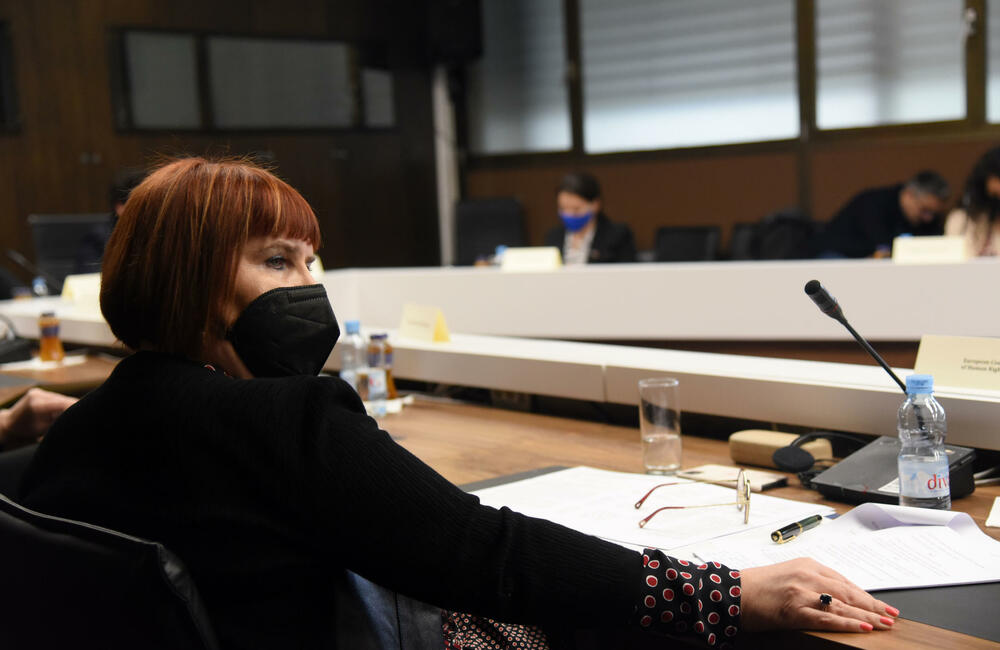
She emphasizes that there were objections to the work of this inspection before the court in Strasbourg.
"We had complaints from the applicants that certain criminal charges were not acted upon within a reasonable time, and compensations were also requested due to the impossibility of accessing the judicial system," said Pavličić.
As an expert, she participated in the Commission for the selection of new inspectors at the end of last year.
"I expect that the selection of new staff with work experience in the judiciary will strengthen the ability of inspectors to read judicial books in the right way," said Pavličić, stressing that it is very important for inspectors to undergo the training necessary to apply regulations on a practical level.
Answering the question of the CIN-CG, how high-quality supervision can be, if it is carried out by one inspector on the same day in the most important prosecutor's offices, Pavličić points out that taking into account the registers and their volume, a certain amount of time is needed for essential control.
"It certainly shouldn't last an hour or two, especially if it's a regular control," concluded the representative of Montenegro before the court in Strasbourg.
On the same day, supervision over the Basic and Higher Prosecutor's Offices in Bijelo Polje
During the four years of supervision from 2017 to 2020, the same inspectors exercised control over the Basic State Prosecutor's Office in Bijelo Polje and the Higher Prosecutor's Office in that city on the same day.
During 2016, as can be seen from the minutes, supervision was carried out only in basic prosecutor's offices. In 2017, the SDT and higher prosecutor's offices were also monitored, and in 2018, the VDT was also monitored for the first time. And while every year at least formal supervision was carried out in the majority of prosecutor's offices, according to the submitted minutes from 2021, only seven controls were carried out, out of a total of 17 prosecutor's offices in Montenegro.
Director of CEGAS Marija Popović Kalezić points out that it is not possible to conclude from the minutes of the performed supervision what the inspectors actually did, while they were exercising control over the prosecutor's offices.
"All records from 2016 to 2022 look the same, so it's not surprising that a large number of prosecutor's offices are monitored in one day," says the director of CEGAS.
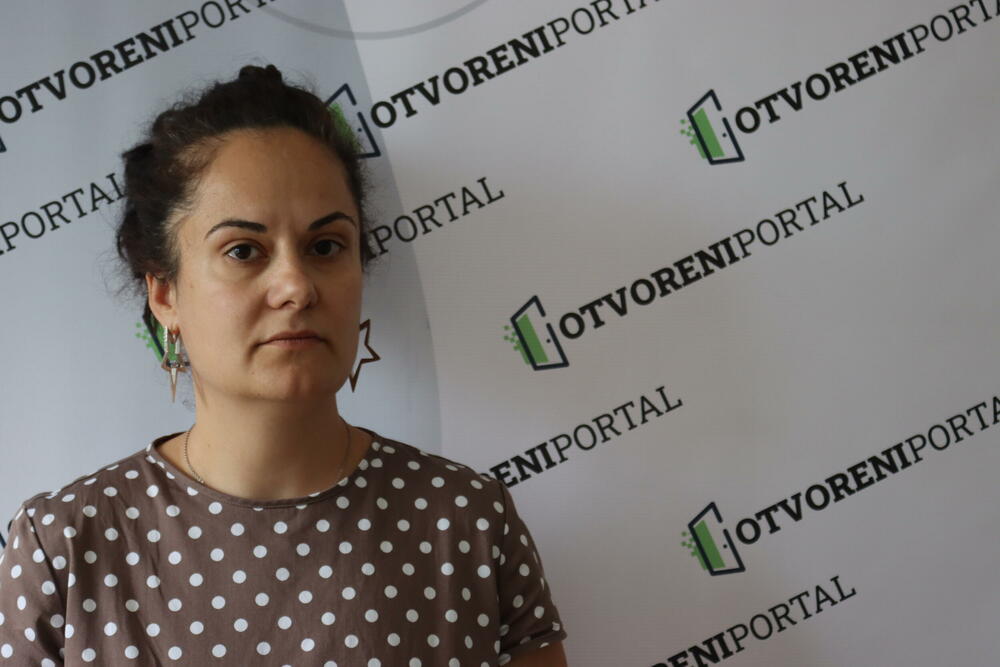
He reminds that the Rulebook, the implementation of which should be controlled by the Ministry, has 160 members, and that the Prosecutor's Office, according to the Law, consists of: work organization, management, internal business, work schedule, assignment of cases, confiscation of assigned cases, duty and readiness, sessions of the state prosecutions and work reports.
Judicial inspectors should control whether the leadership and management of the State Prosecutor's Office is carried out correctly, whether the Supreme and higher prosecutor's offices supervise the lower prosecutor's offices within the prescribed period, how the prosecutor's departments are formed, how the prosecutor's office functions, what are the work reports and statistics, publicity of work, confidentiality of data, protection of personal data, method of assigning and withdrawing subjects, work on individual subjects...
"From all of this, the judicial inspectors control: inscriptions on the doors and arranged binders with serial numbers and criminal registers in which persons are sometimes mentioned, and objects elsewhere, so they are listed as such, quite incomparable and unusable", concludes Popović Kalezić.
There has been no extraordinary supervision for six years
From the submitted data, it can be seen that no extraordinary inspection supervision over the prosecutor's offices was carried out.
Supervision is planned to be regular as well as extraordinary. Extraordinary is determined by the Minister of Justice by decision, on the proposal of the supreme state prosecutor, the head of the higher state prosecution or the president of the Prosecutor's Council.
The Ministry confirmed for CIN-CG that no extraordinary inspections have been carried out in the last six years.
"Given that the Supreme State Prosecutor, the head of the immediately higher State Prosecutor's Office or the President of the Prosecutor's Council, in the previous six years, no proposals were submitted for extraordinary inspection supervision, the Ministry did not carry out extraordinary inspection supervision in the State Prosecutor's Offices," the Ministry said. .
Much more attention should be paid to the system of both internal and external supervision of prosecutor's offices than before, thorough control would improve the efficiency of Montenegrin prosecutorial authorities and contribute to the expected reform, without which there is no progress in the negotiations with Brussels.

CIN-CG
Bonus video:



